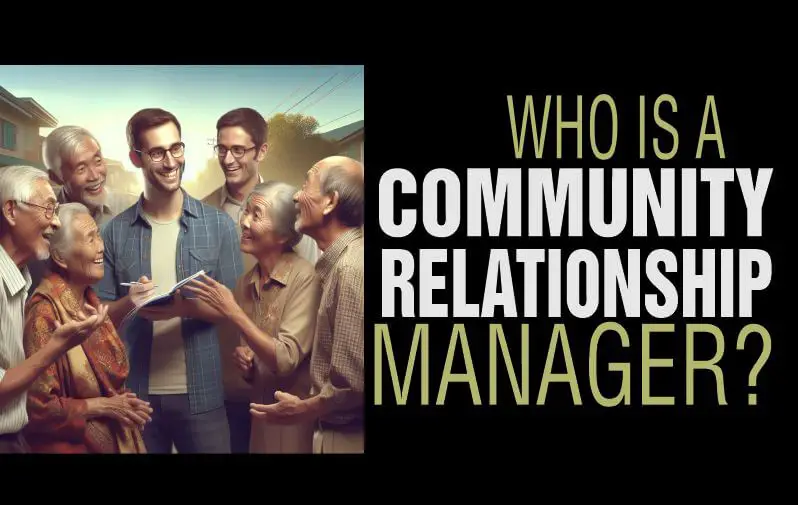Last updated on July 14th, 2024 at 05:50 pm
The community relationship manager is tasked with building strong relationships with a community and an organization.
This role embodies a bridge between the organization and its community, to promote connections, trust, and addressing challenges.
We have put together this piece to explore community relationship management, the core responsibilities of the community relationship manager, essential skills, and the impact they bring to any community-oriented organization.
Related: What is Partner Relationship Management?
Table of Contents
- What is a Community Relationship?
- What is Community Relationship Management?
- Importance of Community Relationship Management
- Key Aspects of Community Relationship Management
- Who is a Community Relationship Manager?
- Core Responsibilities of a Community Relations Manager
- Essential Skills for a Community Relationship Manager
- The Impact of a Community Relationship Manager
- Community Relationship Examples
- Frequently Asked Questions
- Final Thought
What is a Community Relationship?

A community relationship is the interactions, collaborations, and mutual support between an organization and the community it operates within.
It covers the establishment of trust, open communication, and shared values, leading to positive social impact and sustainable development.
Community relationships involve active engagement, understanding local needs, and addressing concerns to establish a sense of belonging and mutual benefit.
Effective community relations manager builds on transparency, empathy, and a genuine commitment to add value.
It contributes to the well-being and prosperity of the community, ultimately creating a harmonious and supportive environment for both the organization and its stakeholders.
Related: Importance of Relationship Management in Banking
What is Community Relationship Management?
Community relationship management is a strategic approach that focuses on building and maintaining positive relationships with a community.
The term “community” can refer to various entities, such as customers, employees, partners, or even society as a whole.
It involves actively engaging with the community through different channels, including social media platforms, online forums, events, and face-to-face interactions.
Its goal is to encourage trust, collaboration, and mutual understanding, ultimately leading to long-term loyalty and support.
Related: Relationship Management in Emotional Intelligence
Importance of Community Relationship Management

Community engagement is crucial in today’s business for several reasons as described below
1. Building Trust and Credibility
Engaging with the community helps businesses build trust and credibility.
By actively participating in community events, supporting local causes, and addressing community concerns, businesses can demonstrate their commitment to the well-being of the community.
2. Customer Loyalty and Advocacy
Engaged communities are more likely to support businesses that actively participate in community initiatives.
By promoting strong relationships with the community, businesses can cultivate customer loyalty and advocacy, leading to positive word-of-mouth referrals and increased customer retention.
3. Brand Reputation and Differentiation
Businesses that engage with their communities in meaningful ways often enjoy a positive brand reputation.
Also Read: What are the Roles of a Client Relationship Manager?
Community involvement can help businesses stand out from competitors and be seen as socially responsible, which can be a significant differentiator in the eyes of consumers.
4. Market Insights and Feedback
Engaging with the community provides businesses with valuable insights and feedback.
By actively listening to community members, businesses can gain a better understanding of local needs, preferences, and trends, which can inform product development, marketing strategies, and overall business decisions.
5. Talent Attraction and Retention
Community engagement can also play a role in attracting and retaining top talent.
Businesses that are actively involved in the community are often seen as desirable employers, and employees may feel a stronger sense of pride and belonging when their employer is engaged in community initiatives.
Related: The Business Relationship Manager and His Roles
Key Aspects of Community Relationship Management
1. Listening: Effective community relationship management begins with actively listening to the needs, concerns, and feedback of the community.
2. Engagement: Engaging with the community is crucial for building relationships. This can involve responding to queries, providing personalized support, organizing events or webinars, sharing knowledge or resources, or encouraging user-generated content.
3. Transparency: Establishing transparency is essential to build trust within the community. Being open and honest about organizational processes, decision-making, and intentions helps create a sense of authenticity and credibility.
4. Collaboration: Encouraging collaboration between the organization and the community is a fundamental aspect of community relationship management.
5. Relationship Nurturing: It focuses on maintaining and nurturing long-term relationships with the community.
6. Advocacy: By building strong relationships, it aims to turn community members into brand advocates. These advocates can promote the organization’s products or services, share positive experiences, and influence others within their social network.
Related: What Does a Relationship Manager Do?
Who is a Community Relationship Manager?

A community relationship manager is a professional responsible for encouraging and maintaining positive relationships between an organization and the community it serves.
Their role involves engaging with community members, understanding their needs and concerns, and representing their interests within the organization.
They often organize and participate in community events, collaborate with local stakeholders, and advocate for community-related initiatives.
They play a vital role in building trust, enhancing the organization’s reputation, and ensuring that the business’s activities align with the needs and values of the community, ultimately contributing to positive social impact and sustainable business growth.
Core Responsibilities of a Community Relations Manager
1. Building Trust and Rapport: A community relations manager must establish trust and rapport with community members by actively engaging in dialogue, listening to concerns, and addressing them promptly.
2. Community Advocacy: He acts as an advocate for the community, ensuring their voices are heard and their needs are met.
3. Stakeholder Engagement: The manager is responsible for engaging and maintaining positive relationships with various stakeholders, such as customers, employees, local government officials, and community organizations.
4. Crisis Management: When a crisis or controversy arises, the manager steps into action by promptly addressing concerns, providing accurate information, and managing public relations.
Essential Skills for a Community Relationship Manager
Just like other managers, the community relationship manager should have the following skills:
1. Exceptional Communication Skills
The ability to communicate clearly and effectively is fundamental for a CRM.
They must be proficient in both written and verbal communication to engage with various stakeholders and present information in a way that resonates with the community.
2. Relationship Building
A community relationship manager should possess strong interpersonal skills to foster positive relationships within the community.
This involves active listening, empathy, and the ability to understand diverse perspectives to build connections based on trust and mutual respect.
3. Cultural Sensitivity
Communities are diverse, comprising individuals from different backgrounds, cultures, and beliefs.
A manager of community relationships should embrace cultural sensitivity to effectively engage with every community member, ensuring their voices are heard and valued.
4. Problem-Solving Skills
The manager of community relationships must have the ability to identify challenges within the community and propose effective solutions.
Problem-solving skills enable the CRM to address concerns, actively find resolutions, and improve the organization’s relationship with the community.
The Impact of a Community Relationship Manager
1. Enhanced Reputation
An effective CRM can greatly enhance an organization’s reputation within the community.
By actively engaging, addressing concerns, and advocating for community needs, the manager ensures a positive perception of the organization, leading to increased loyalty and support.
2. Increased Customer Engagement and Loyalty
Through proactive engagement, the manager helps encourage a sense of loyalty among existing customers and builds relationships with potential customers.
By establishing a strong connection, he increases customer engagement, leading to higher customer retention rates and increased brand advocacy.
3. Community-Informed Decision Making
The community relations manager acts as a valuable source of community insight.
By gathering feedback, concerns, and suggestions from the community, he enables the organization to make informed decisions that align with the community’s needs and desires.
4. Social Impact
A proficient manager of community relationships brings about positive social change by organizing community-oriented events, collaborating with local organizations, and supporting community-driven initiatives.
Through these efforts, the CRM contributes to the betterment of the community and helps the organization fulfill its corporate social responsibility.
Community Relationship Examples
Community relationship examples can include various initiatives and activities aimed at engaging with and supporting the community.
Some examples of community relationship management initiatives are:
1. Corporate Social Responsibility (CSR) Programs
Businesses often engage in CSR activities such as environmental sustainability projects, community development initiatives, and charitable contributions to support the well-being of the community.
2. Local Sponsorships and Partnerships
Businesses may sponsor local events, sports teams, or cultural activities to demonstrate their commitment to the community and build positive relationships.
3. Community Outreach and Engagement
This can involve organizing town hall meetings, participating in local fairs and festivals, or hosting educational workshops to connect with community members and address their concerns.
4. Philanthropic Initiatives
Businesses may support local charities, non-profit organizations, or educational institutions to contribute to the betterment of the community.
5. Collaborative Projects
Engaging in collaborative projects with local businesses, government agencies, or community organizations to address common challenges or promote economic development.
Frequently Asked Questions
What skills do you need to be a community relations manager?
Skills for a community relations manager: Communication, relationship-building, problem-solving, public speaking, strategic planning, empathy, cultural competence, and project management.
What is community relationship management?
Community relationship management involves encouraging positive interactions, collaborations, and support between an organization and the community it serves, aiming for mutual benefit.
What do community relations managers do?
They engage with the community, represent organizational interests, organize events, address concerns, and build partnerships to foster positive community relationships.
What is the purpose of a community relationship?
The purpose of a community relationship is to establish trust, support local well-being, address concerns, and create a harmonious environment for mutual benefit and sustainable development.
What is an example of a community relationship?
Example of a community relationship: A company sponsoring a local environmental cleanup initiative to support the community’s well-being and demonstrate environmental stewardship.
Final Thought
Community relationship management plays a pivotal part in the success of community-oriented organizations.
By building trust, engaging stakeholders, and enhancing connections, the community relationship manager sets a solid foundation for growth, reputation enhancement, and long-term success.
The skills and impact of the manager of community relationships extend far beyond community engagement, as they actively contribute to an organization’s overall strategy and social responsibility.
As community dynamics continue to evolve, the role of the community relations manager will remain essential in maintaining thriving relationships between an organization and its community.
References:
- https://www.prmrinc.net/blog/how-important-is-community-relations-to-a-company
- https://maclyngroup.com/public-relations/what-is-community-relations-and-why-is-it-important/
- https://online-distance.ncsu.edu/career/community-relations-manager/
- https://engagementhub.com.au/community-engagement/community-relationship-management-tool/
- https://www.savannahhq.com/2021/11/03/what-is-a-community-relationship-manager/
Pyo Merez (PsyD) is a distinguished adolescent and adult psychologist at the forefront of mental health advocacy.
With expertise in cognitive and developmental psychology, focusing on social relationships, cultural contexts, and individual differences, Pyo has dedicated his career to empowering adolescents and adults.
As a sought-after speaker and panelist, Pyo shares invaluable insights on issues affecting young people, contributing to a deeper understanding of mental health and well-being in today's society.


